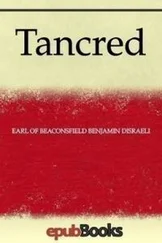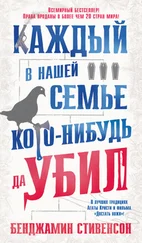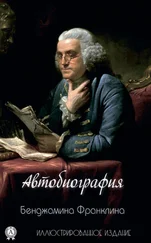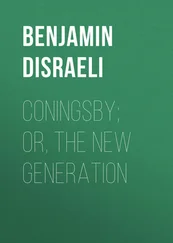Бенджамин Дизраэли - Coningsby
Здесь есть возможность читать онлайн «Бенджамин Дизраэли - Coningsby» весь текст электронной книги совершенно бесплатно (целиком полную версию без сокращений). В некоторых случаях можно слушать аудио, скачать через торрент в формате fb2 и присутствует краткое содержание. Год выпуска: 2014, Издательство: epubBooks Classics, Жанр: Классическая проза, на английском языке. Описание произведения, (предисловие) а так же отзывы посетителей доступны на портале библиотеки ЛибКат.
- Название:Coningsby
- Автор:
- Издательство:epubBooks Classics
- Жанр:
- Год:2014
- ISBN:нет данных
- Рейтинг книги:4 / 5. Голосов: 1
-
Избранное:Добавить в избранное
- Отзывы:
-
Ваша оценка:
- 80
- 1
- 2
- 3
- 4
- 5
Coningsby: краткое содержание, описание и аннотация
Предлагаем к чтению аннотацию, описание, краткое содержание или предисловие (зависит от того, что написал сам автор книги «Coningsby»). Если вы не нашли необходимую информацию о книге — напишите в комментариях, мы постараемся отыскать её.
Coningsby — читать онлайн бесплатно полную книгу (весь текст) целиком
Ниже представлен текст книги, разбитый по страницам. Система сохранения места последней прочитанной страницы, позволяет с удобством читать онлайн бесплатно книгу «Coningsby», без необходимости каждый раз заново искать на чём Вы остановились. Поставьте закладку, и сможете в любой момент перейти на страницу, на которой закончили чтение.
Интервал:
Закладка:
'It is very odd,' said Tadpole, 'but I was thinking of the very same thing.'
'It will be fifteen years before England will see a Tory Government,' said Mr. Rigby, drawing his ramrod, 'and then it will only last five months.'
'Melbourne, Althorp, and Durham, all in the Lords,' said Taper. 'Three leaders! They must quarrel.'
'If Durham come in, mark me, he will dissolve on Household Suffrage and the Ballot,' said Tadpole.
'Not nearly so good a cry as Church,' replied Taper.
'With the Malt Tax,' said Tadpole. 'Church, without the Malt Tax, will not do against Household Suffrage and Ballot.'
'Malt Tax is madness,' said Taper. 'A good farmer's friend cry without Malt Tax would work just as well.'
'They will never dissolve,' said the Duke. 'They are so strong.'
'They cannot go on with three hundred majority,' said Taper. 'Forty is as much as can be managed with open constituencies.'
'If he had only gone to Paris instead of Rome!' said the Duke.
'Yes,' said Mr. Rigby, 'I could have written to him then by every post, and undeceived him as to his position.'
'After all he is the only man,' said the Duke; 'and I really believe the country thinks so.'
'Pray, what is the country?' inquired Mr. Rigby. 'The country is nothing; it is the constituency you have to deal with.'
'And to manage them you must have a good cry,' said Taper. 'All now depends upon a good cry.'
'So much for the science of politics,' said the Duke, bringing down a pheasant. 'How Peel would have enjoyed this cover!'
'He will have plenty of time for sport during his life,' said Mr. Rigby.
On the evening of the 15th of November, a despatch arrived at Beaumanoir, informing his Grace that the King had dismissed the Whig Ministry, and sent for the Duke of Wellington. Thus the first agitating suspense was over; to be succeeded, however, by expectation still more anxious. It was remarkable that every individual suddenly found that he had particular business in London which could not be neglected. The Duke very properly pleaded his executorial duties; but begged his guests on no account to be disturbed by his inevitable absence. Lord Fitz–Booby had just received a letter from his daughter, who was indisposed at Brighton, and he was most anxious to reach her. Tadpole had to receive deputations from Wesleyans, and well–registered boroughs anxious to receive well–principled candidates. Taper was off to get the first job at the contingent Treasury, in favour of the Borough of Shabbyton. Mr. Rigby alone was silent; but he quietly ordered a post–chaise at daybreak, and long before his fellow guests were roused from their slumbers, he was halfway to London, ready to give advice, either at the pavilion or at Apsley House.
Chapter IV.
Although it is far from improbable that, had Sir Robert Peel been in England in the autumn of 1834, the Whig government would not have been dismissed; nevertheless, whatever may now be the opinion of the policy of that measure; whether it be looked on as a premature movement which necessarily led to the compact reorganisation of the Liberal party, or as a great stroke of State, which, by securing at all events a dissolution of the Parliament of 1832, restored the healthy balance of parties in the Legislature, questions into which we do not now wish to enter, it must be generally admitted, that the conduct of every individual eminently concerned in that great historical transaction was characterised by the rarest and most admirable quality of public life, moral courage. The Sovereign who dismissed a Ministry apparently supported by an overwhelming majority in the Parliament and the nation, and called to his councils the absent chief of a parliamentary section, scarcely numbering at that moment one hundred and forty individuals, and of a party in the country supposed to be utterly discomfited by a recent revolution; the two ministers who in this absence provisionally administered the affairs of the kingdom in the teeth of an enraged and unscrupulous Opposition, and perhaps themselves not sustained by a profound conviction, that the arrival of their expected leader would convert their provisional into a permanent position; above all the statesman who accepted the great charge at a time and under circumstances which marred probably the deep projects of his own prescient sagacity and maturing ambition; were all men gifted with a high spirit of enterprise, and animated by that active fortitude which is the soul of free governments.
It was a lively season, that winter of 1834! What hopes, what fears, and what bets! From the day on which Mr. Hudson was to arrive at Rome to the election of the Speaker, not a contingency that was not the subject of a wager! People sprang up like mushrooms; town suddenly became full. Everybody who had been in office, and everybody who wished to be in office; everybody who had ever had anything, and everybody who ever expected to have anything, were alike visible. All of course by mere accident; one might meet the same men regularly every day for a month, who were only 'passing through town.'
Now was the time for men to come forward who had never despaired of their country. True they had voted for the Reform Bill, but that was to prevent a revolution. And now they were quite ready to vote against the Reform Bill, but this was to prevent a dissolution. These are the true patriots, whose confidence in the good sense of their countrymen and in their own selfishness is about equal. In the meantime, the hundred and forty threw a grim glance on the numerous waiters on Providence, and amiable trimmers, who affectionately enquired every day when news might be expected of Sir Robert. Though too weak to form a government, and having contributed in no wise by their exertions to the fall of the late, the cohort of Parliamentary Tories felt all the alarm of men who have accidentally stumbled on some treasure–trove, at the suspicious sympathy of new allies. But, after all, who were to form the government, and what was the government to be? Was it to be a Tory government, or an Enlightened–Spirit–of–the–Age Liberal–Moderate–Reform government; was it to be a government of high philosophy or of low practice; of principle or of expediency; of great measures or of little men? A government of statesmen or of clerks? Of Humbug or of Humdrum? Great questions these, but unfortunately there was nobody to answer them. They tried the Duke; but nothing could be pumped out of him. All that he knew, which he told in his curt, husky manner, was, that he had to carry on the King's government. As for his solitary colleague, he listened and smiled, and then in his musical voice asked them questions in return, which is the best possible mode of avoiding awkward inquiries. It was very unfair this; for no one knew what tone to take; whether they should go down to their public dinners and denounce the Reform Act or praise it; whether the Church was to be re–modelled or only admonished; whether Ireland was to be conquered or conciliated.
'This can't go on much longer,' said Taper to Tadpole, as they reviewed together their electioneering correspondence on the 1st of December; 'we have no cry.'
'He is half way by this time,' said Tadpole; 'send an extract from a private letter to the Standard , dated Augsburg, and say he will be here in four days.'
At last he came; the great man in a great position, summoned from Rome to govern England. The very day that he arrived he had his audience with the King.
It was two days after this audience; the town, though November, in a state of excitement; clubs crowded, not only morning rooms, but halls and staircases swarming with members eager to give and to receive rumours equally vain; streets lined with cabs and chariots, grooms and horses; it was two days after this audience that Mr. Ormsby, celebrated for his political dinners, gave one to a numerous party. Indeed his saloons to–day, during the half–hour of gathering which precedes dinner, offered in the various groups, the anxious countenances, the inquiring voices, and the mysterious whispers, rather the character of an Exchange or Bourse than the tone of a festive society.
Читать дальшеИнтервал:
Закладка:
Похожие книги на «Coningsby»
Представляем Вашему вниманию похожие книги на «Coningsby» списком для выбора. Мы отобрали схожую по названию и смыслу литературу в надежде предоставить читателям больше вариантов отыскать новые, интересные, ещё непрочитанные произведения.
Обсуждение, отзывы о книге «Coningsby» и просто собственные мнения читателей. Оставьте ваши комментарии, напишите, что Вы думаете о произведении, его смысле или главных героях. Укажите что конкретно понравилось, а что нет, и почему Вы так считаете.
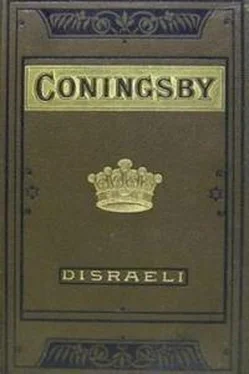
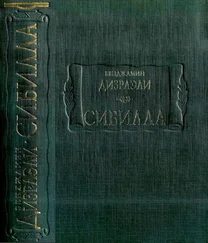
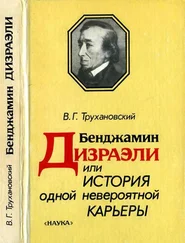
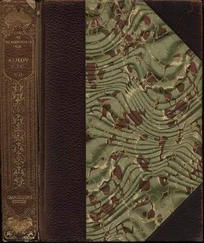

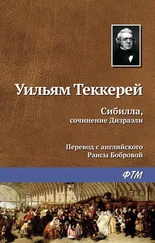
![Мелани Бенджамин - Госпожа отеля «Ритц» [litres]](/books/384861/melani-bendzhamin-gospozha-otelya-ritc-litres-thumb.webp)

